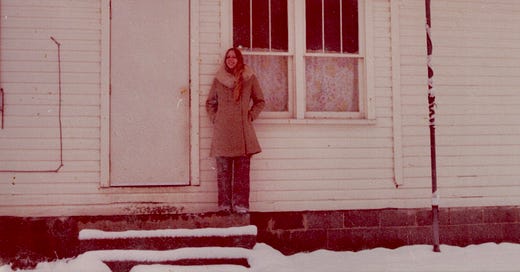During the brutally cold winter of 1976-77, I taught a special education class at Tacy School in Barbour County, West Virginia. It was a two-room schoolhouse in a very rural area. The school was surrounded by fields and pastures, giving it a sometimes spooky feeling of isolation.
A short way down the road was a tiny country store, with a couple of long-abandoned vintage gas pumps out front. The store seemed to be open on a very limited and completely random schedule. They had a small inventory: if you needed marshmallows, ketchup, 60-watt light bulbs, or a can of Quaker State motor oil, you were in luck. The main attraction of the Tacy store seemed to be its pot-bellied stove, where locals warmed up and traded stories.
One freezing cold morning, my husband dropped me off in front of the school as usual, and headed off to his job at Belington Middle School.
I waved good-bye and hurried to the door, eager to get out of the frigid air and start the furnace before the students arrived in 40 minutes.
I turned my key in the door, and it snapped off in the frozen lock.
It was 20 degrees F, and I was stuck outside.
1977 was long before cell phones, and not everyone in the area had a landline. Luckily for me, the Tacy store did, and even luckier, the proprietor was stoking up the woodstove when I knocked on the door at 7:20 in the morning. He seemed excessively amused by my predicament, but he allowed me to use his phone, and the half-inch thick local phone book, so I could call the district office for help.
*******************************************************************
Most of my students were between the ages of 7 -13, and all had significant educational support needs. Our class was made up of students from across the county, whose needs couldn’t be served in any of the other placement options. They had a wide range of disabilities, including Down syndrome and other chromosomal disorders, cerebral palsy, seizures, and other health impairments.
At age 17, Jon was much bigger and older than the other students. Although his verbal communication was good, and his coordination and motor abilities were strong, he had almost no academic skills. He lived with his elderly aunt and uncle, who became his guardians due to circumstances that were never fully explained to me, but there was mention of assault and arson, and an emergency psychiatric hospitalization.
Despite heavy doses of psychotropic medications, John was always edgy and anxious.
You might think that printing the 3 letters of his name would be a reasonably simple goal. He could copy it accurately: J O N. But when asked to write it independently, he might write “O N J” or “N J O.” It always contained the correct letters, but in random order. He was highly offended when I told him that there is only one arrangement of the 3 letters that actually spells “Jon.”
“Well, that’s what I wrote!!!! J O N !!!!!!” he shouted in exasperation, pointing accurately in turn to the letters J O N, no matter what order he had written them in. He found my rigid interpretation of the correct way to write his name quite frustrating and vexing.
It’s a bad idea to frustrate and vex someone who is constantly on the verge of losing self-control, especially over a task that he finds meaningless.
So it was fine. He could write “O J N” or “N O J” on his worksheet, and sure enough, I knew it was Jon’s.
Instead we focused on developing Jon’s strengths and interests. Physical activity helped Jon to manage his emotional reactions. He was a natural athlete, and he loved gardening, especially pushing a wheelbarrow, moving heavy rocks, and digging holes.
With coaching and lots of practice, Jon won a gold medal for softball throw in the Barbour County Special Olympics. Even more exciting, he got to travel to Charleston for the statewide West Virginia Special Olympics, where he won a silver medal.
That meant a lot to Jon, and to his aunt and uncle. Jon had been recognized and honored for his skill, and his many hours of practice. He and his guardians were so proud of his accomplishments, and his medals. Success and positive recognition had been rare in Jon’s life, and they were soaking it all in.
I still sort of wished that he had learned to write his name. But becoming a champion athlete gave Jon self-esteem and changed his life in ways that “correctly” writing his name couldn’t approach.
**********************************************************
One Monday morning, when I asked the students what they had done over the weekend, Jon eagerly volunteered that he had been to a funeral and saw a man in a box. I asked Jon whose funeral it was, and he replied, “I don’t know! I introduced myself to the guy in the box and asked him what his name is, but he wouldn’t talk to me!!! That’s so rude!!!”




